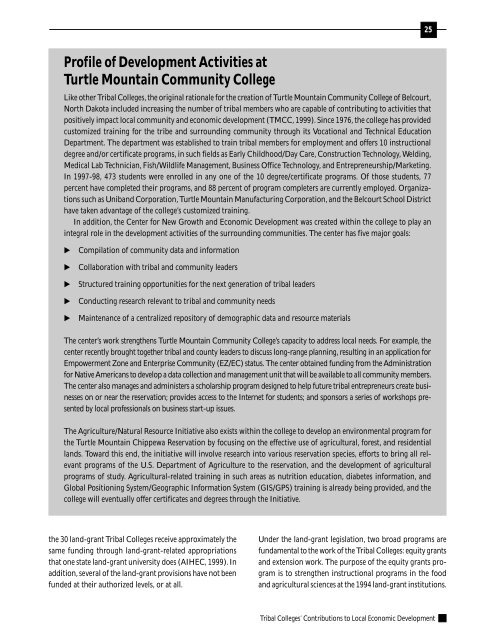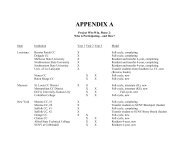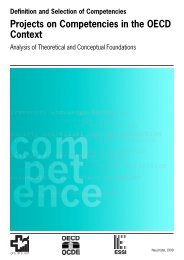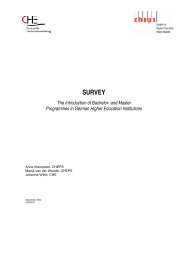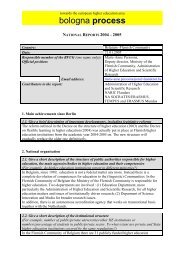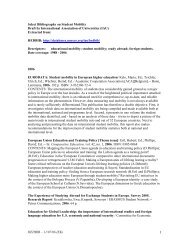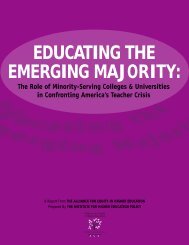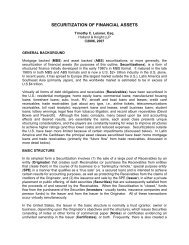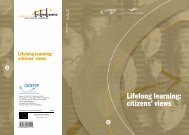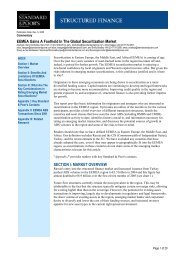24involved in a series of court and legislative battles <strong>to</strong> protectthe land from coal development (Wilson, 1993).In reaction <strong>to</strong> such problems, <strong>Tribal</strong> <strong>College</strong>s increasingly havebecome involved in promoting the sustainable developmen<strong>to</strong>f natural resources on their reservations. For instance, theMenominee Sustainable <strong>Development</strong> Institute at <strong>College</strong> ofthe Menominee Nation in Keshena, Wisconsin works <strong>to</strong> helppreserve the tribe’s substantial forest resources while still producingenough income from forest products <strong>to</strong> enable a strongeconomy. Toward this end, the Institute has two goals: <strong>to</strong> researchand describe the Menominee model of a sustainablecommunity; and <strong>to</strong> provide education about sustainable development<strong>to</strong> a broad audience (Davis, 1996). In addition,Bay Mills Community <strong>College</strong> of Brimley, Michigan is developinga new curriculum in Sustainable <strong>Development</strong>, focusingon six primary areas: Environmental Science, <strong>Economic</strong>s,His<strong>to</strong>ry, Political Systems and Institutions, Community,and Culture and Spirituality. 15Meanwhile, <strong>Tribal</strong> <strong>College</strong>s also can help with instructionand technical assistance, in order <strong>to</strong> allow tribal members<strong>to</strong> be a part of agricultural and natural resource development.For example, the Navajo reservation has relativelyundeveloped sources of coal, natural gas, and uranium, aswell as underutilized land and water resources. In order <strong>to</strong>develop these resources, “the Navajo Nation needs moreNavajo individuals who are formally educated in such fieldsas engineering, range conservation, hydrology, businessmanagement, natural resource development, and rural socialand economic development” (Lewis, 1993, p. 24).<strong>Tribal</strong> <strong>College</strong>s also can prepare students in fields that are related<strong>to</strong> the land, such as nutrition, family health, and <strong>to</strong>urism.For example, Little Big Horn <strong>College</strong> is helping the Crow IndianReservation in Montana <strong>to</strong> take advantage of its proximity<strong>to</strong> Little Big Horn Battlefield, site of Custer’s last stand. Therecently established Institute for Microbusiness and Tourismnow offers Indian-designed and led <strong>to</strong>urs of the site, in addition<strong>to</strong> fly-fishing trips and his<strong>to</strong>ric <strong>to</strong>urs of various reservationsites (Boyer, 1997). <strong>Tribal</strong> <strong>College</strong>s can provide targetedcoursework and research that addresses these issues, especiallywith their recent designation as land-grant colleges.Land-grant status of the collegesIn 1994, 30 <strong>Tribal</strong> <strong>College</strong>s obtained land-grant statusthrough the Equity in Educational Land-Grant Status Act.The report accompanying the legislation concluded thatthe <strong>Tribal</strong> <strong>College</strong>s have similar missions <strong>to</strong> those of existingland-grant institutions, and that their designationas land-grant colleges could assist them in accomplishingtheir missions (U.S. Congress, 1993). The Act gives30 <strong>Tribal</strong> <strong>College</strong>s (the “1994 land-grant institutions”)land-grant status 16 and makes available several types offunding (Bigart, 1997; U.S. Congress, 1993; AIHEC,1999a): 17 Instead of receiving land for endowments, the 1994institutions are authorized <strong>to</strong> receive interest incomefrom an endowment fund, <strong>to</strong> be built from $4.6 millionappropriations for each year between 1996 and2002 (for a <strong>to</strong>tal endowment of $32.2 million, if thefunds are appropriated). Each 1994 institution is authorized <strong>to</strong> receive $50,000per year <strong>to</strong> fund instruction in food and agriculturalsciences, as a replacement for Second Morrill Act appropriations.In FY1999, $1,552,000 was appropriatedfor these equity grants.Between Fiscal Years 1996 and 2002, $1.7 million peryear has been authorized for competitive grants forbuildings, labora<strong>to</strong>ries, and other capital facilities, althoughthe funds have not been appropriated.An annual $5 million was authorized for agriculturalextension work by the 1994 institutions in cooperationwith any 1862 or 1890 land-grant institution. Thesefunds are awarded on a competitive basis. In Fiscal Year1999, approximately $2 million was appropriated forthe extension program.Beginning in Fiscal Year 1999 and authorized through2002, the colleges can compete for applied researchgrants in agriculture through a research program targeted<strong>to</strong>ward the 1994 institutions.The 1994 institutions do not receive as much funding asother land-grant institutions. AIHEC estimates that <strong>to</strong>gether,15See the college’s website (www.bmcc.org).16Initially, 29 of the colleges were designated as land-grant institutions through the Equity in Educational Land-Grant Status Act; in 1998, LittlePriest <strong>Tribal</strong> <strong>College</strong> was added after it split from Nebraska Indian Community <strong>College</strong>, which already had been a land-grant institution.17However, the legislation excludes them from certain types of funding: agricultural experiment stations under the 1887 Hatch Act; agriculturalextension work under the 1914 Smith-Lever Act; and college aid appropriations under the Second Morrill Act (Bigart, 1997).<strong>Tribal</strong> <strong>College</strong>s’ <strong>Contributions</strong> <strong>to</strong> <strong>Local</strong> <strong>Economic</strong> <strong>Development</strong>
25Profile of <strong>Development</strong> Activities atTurtle Mountain Community <strong>College</strong>Like other <strong>Tribal</strong> <strong>College</strong>s, the original rationale for the creation of Turtle Mountain Community <strong>College</strong> of Belcourt,North Dakota included increasing the number of tribal members who are capable of contributing <strong>to</strong> activities thatpositively impact local community and economic development (TMCC, 1999). Since 1976, the college has providedcus<strong>to</strong>mized training for the tribe and surrounding community through its Vocational and Technical EducationDepartment. The department was established <strong>to</strong> train tribal members for employment and offers 10 instructionaldegree and/or certificate programs, in such fields as Early Childhood/Day Care, Construction Technology, Welding,Medical Lab Technician, Fish/Wildlife Management, Business Office Technology, and Entrepreneurship/Marketing.In 1997-98, 473 students were enrolled in any one of the 10 degree/certificate programs. Of those students, 77percent have completed their programs, and 88 percent of program completers are currently employed. Organizationssuch as Uniband Corporation, Turtle Mountain Manufacturing Corporation, and the Belcourt School Districthave taken advantage of the college’s cus<strong>to</strong>mized training.In addition, the Center for New Growth and <strong>Economic</strong> <strong>Development</strong> was created within the college <strong>to</strong> play anintegral role in the development activities of the surrounding communities. The center has five major goals:Compilation of community data and informationCollaboration with tribal and community leadersStructured training opportunities for the next generation of tribal leadersConducting research relevant <strong>to</strong> tribal and community needsMaintenance of a centralized reposi<strong>to</strong>ry of demographic data and resource materialsThe center’s work strengthens Turtle Mountain Community <strong>College</strong>’s capacity <strong>to</strong> address local needs. For example, thecenter recently brought <strong>to</strong>gether tribal and county leaders <strong>to</strong> discuss long-range planning, resulting in an application forEmpowerment Zone and Enterprise Community (EZ/EC) status. The center obtained funding from the Administrationfor Native Americans <strong>to</strong> develop a data collection and management unit that will be available <strong>to</strong> all community members.The center also manages and administers a scholarship program designed <strong>to</strong> help future tribal entrepreneurs create businesseson or near the reservation; provides access <strong>to</strong> the Internet for students; and sponsors a series of workshops presentedby local professionals on business start-up issues.The Agriculture/Natural Resource Initiative also exists within the college <strong>to</strong> develop an environmental program forthe Turtle Mountain Chippewa Reservation by focusing on the effective use of agricultural, forest, and residentiallands. Toward this end, the initiative will involve research in<strong>to</strong> various reservation species, efforts <strong>to</strong> bring all relevantprograms of the U.S. Department of Agriculture <strong>to</strong> the reservation, and the development of agriculturalprograms of study. Agricultural-related training in such areas as nutrition education, diabetes information, andGlobal Positioning System/Geographic Information System (GIS/GPS) training is already being provided, and thecollege will eventually offer certificates and degrees through the Initiative.the 30 land-grant <strong>Tribal</strong> <strong>College</strong>s receive approximately thesame funding through land-grant-related appropriationsthat one state land-grant university does (AIHEC, 1999). Inaddition, several of the land-grant provisions have not beenfunded at their authorized levels, or at all.Under the land-grant legislation, two broad programs arefundamental <strong>to</strong> the work of the <strong>Tribal</strong> <strong>College</strong>s: equity grantsand extension work. The purpose of the equity grants programis <strong>to</strong> strengthen instructional programs in the foodand agricultural sciences at the 1994 land-grant institutions.<strong>Tribal</strong> <strong>College</strong>s’ <strong>Contributions</strong> <strong>to</strong> <strong>Local</strong> <strong>Economic</strong> <strong>Development</strong>


